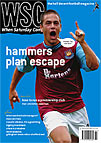 Two of the biggest clubs in Brazilian football have been affected in different ways by the strange nature of the game there. Robert Shaw investigates
Two of the biggest clubs in Brazilian football have been affected in different ways by the strange nature of the game there. Robert Shaw investigates
Back in the 1950s and 1960s, Botafogo v Santos games were titanic struggles involving the cream of Brazil’s talent, with Garrincha and Pelé taking top billing for their respective sides. In 2002 the two clubs had divergent fortunes. Santos won the championship, beating Corinthians 5-2 on aggregate in December’s play-off final. The team were coached by Emerson Leão, the former goalkeeper renowned more for modelling swimming trunks than for a less-than-successful spell as national coach during World Cup qualifying.
Santos’s triumph highlighted a particular flaw in the eight-team play-off format: they had finished eighth at the end of the first stage (in which all 26 teams played each other once), 13 points behind São Paulo at the top. Two other semi-finalists – Grêmio and Fluminense – finished fifth and seventh. Hence the pressure for next year’s championship to be played on a home-and-away basis with the aggregate points total as the sole decider. As with late-night midweek kick-offs and weekend starts in afternoon temperatures of 40-plus degrees, Globo television may still hold sway on some points. Brazilian TV loves the cut-and-thrust of play-offs and is loath to accept a shift to Premiership-style rules.
But for Botafogo it has been quite a different story. History has undoubtedly been a millstone around the club’s neck. Any visitor who arrives at the top of the Maracanã stadium’s Bellini Ramp (named after the 1958 World Cup skipper) is tempted to imitate the locals, reverentially patting the bust of Garrincha in a way that reflects a saudade (longing) for stars like the “Little Bird” in today’s Botafogo line-up. Botafogo have been in decline since the 1970s. The only real high point came in 1995 when “Fogo” snatched the national championship from Santos. But the club’s potential was revealed when over 100,000 botafoguenses packed into the Maracanã for the 1999 Copa do Brasil final.
Bebeto de Freitas, president-elect of the club and a modernising force in Brazilian football, likes to emphasise this potential. “Research shows that we have got something like eight to ten million fans in the country.”
He is currently involved in controversy since Botafogo have been officially relegated after finishing last in the 26-team league. Bebeto has publicly said that Botafogo “should return on the field” and not through one of the notorious viradas da mesa (turning of the tables) which have been used in the past to block relegation. In 1996 Fluminense finished second bottom of the first division but were spared the drop. The reprieve was shortlived, however: they were relegated the following year, even dropping down to the third division in 1998. They then performed an amazing leap, being “invited” straight back into the first.
Bebeto has since qualified his stated preference: “When the second division is not a strong competitive league then we still need to protect Botafogo’s interests.” (The chances of a virada da mesa increased with the relegation of Palmeiras, four times national champions. The withdrawal of sponsorship money from the Italian corporate giant Parmalat a couple of years ago started the rot, but few expected them to make the drop.)
November’s presidential election was characterised by infighting, disputes over eligibility of voters and a range of other machinations, but Bebeto de Freitas is nothing if not bullish about the future: “You can’t compare Botafogo with other clubs in Brazil and I don’t want to blame this for all the problems. My main aim as president will be to recover the credibility of the club.” This despite a four-month lag in paying players’ salaries and a debt which Bebeto admits is over £10 million – training sessions have been cancelled because of unpaid electricity bills.
When a 1-0 defeat to São Paulo finally pushed the alvinegros (the black and whites) through the trapdoor, distraught fans vented their frustration by throwing missiles on to the pitch. The most pathetic sight that afternoon was the protest of one fan who tossed one of his trainers at a linesman. It missed and remained undisturbed and seemingly invisible on the pitch, such was the nature of the game. Undeterred, he threw the other, this one recording a direct hit on the linesman.
From WSC 192 February 2003. What was happening this month